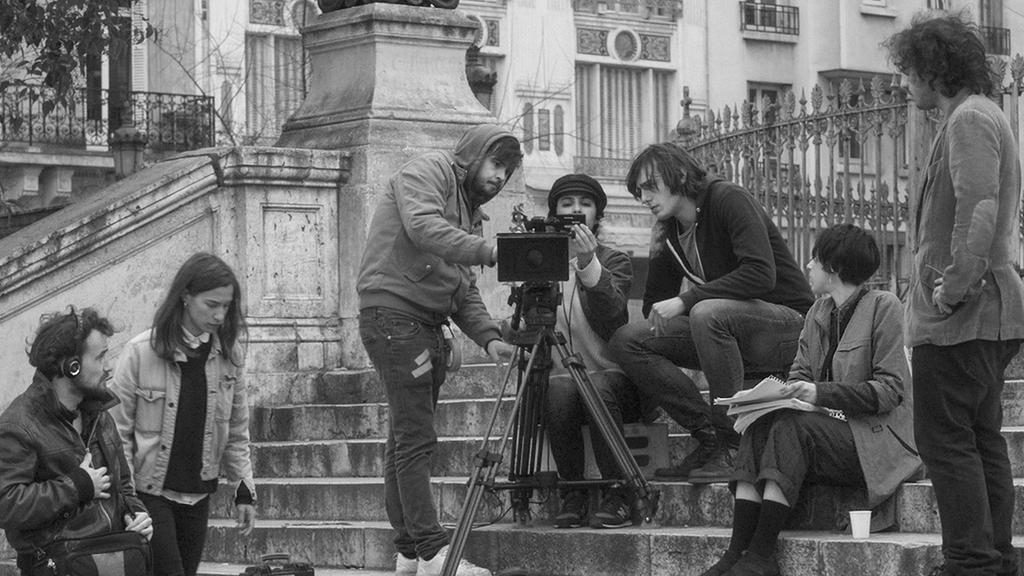Vive la différence. From The Young Ones to Fresh Meat, British takes on the student experience have generally leaned in a comic direction, yielding a rich parade of embarrassments and humiliations. A Paris Education is the Gallic riposte: shot in forgiving black-and-white, scored to the most elegant of Mahler selections, and stocked heavy with scenes of film students sitting around discussing the movies that made them, the politics of their present, and their hopes for the future. There's not a pantsing or pratfall in sight. That framing, and lead Andranic Manet's moptop-and-sideburns combo may fool some into thinking Jean-Paul Civeyrac's film is a period piece; in fact, a few early Skype interactions and the invocation of the godhead Tarantino soon establishes that this particular education is taking place somewhere close to the present day. Civeyrac demonstrates a desire to treat that present - our present - as a slice of time worthy of the preservation and canonisation that follows from shooting in New Wavey monochrome, as a moment that itself merits close, sustained study. The thesis will be tested over a longish two hours and twenty minutes, but at its best, A Paris Education resembles a Philippe Garrel film removed of that soixante-huitard's highfalutin fustiness, and granted at least a toehold on the 21st century. En route, Civeyrac formulates a sincere defence of this artform as a means of finding ourselves, clumsy and haphazard as that process can sometimes be.
This the film builds through a succession of commonplace interactions. Displaced to the French capital, provincial protagonist Etienne (Manet) finds his relationship with his hometown sweetheart challenged by their newfound distance, and his sudden proximity to those actresses who only ever show up in French movies. Elsewhere, there are matters of friendship and rivalry to negotiate, most urgently with classmate Mathias Valence (nickname: "Liberty"), played by Corentin Fila as a type all too recognisable from Film Twitter, namely the young know-it-all who insists on taking a contrary line in order to distinguish himself as a unique voice, the one true keeper of the cinematic flame. Mathias proves as much a source of fascination for Etienne (and the film) as those jolies mademoiselles, because he presents as entirely self-sufficient, and therefore a challenge to his contemporaries' bourgeois complacency. (He'd hate the comparison, but he's something like the Ferris Bueller of French film school.) For his part, Manet plays Etienne as an inchoate lump, markedly heavier in thought and gait than the bright sparks and dashing blades around him; if his surprising strike rate with the opposite sex marks A Paris Education as identifiably the work of a male writer-director, it arguably reflects the fraught sexual merry-go-round that is the collegiate experience, and perhaps - just perhaps - these women see the potential in Etienne that Civeyrac himself observes. This kid's basically a clod of clay, yanked from the sticks to be reshaped in the city - poked in the direction of books, meetings and ideas he wouldn't ordinarily have gone near. What keeps the film straight - what rescues it from the art-flick indulgence it sometimes meanders into - is this belief in scholars as works-in-progress, and in higher-ed as a crucible or kiln, a forum capable of converting even the least promising elements into something solid. Civeyrac sees that it's the making of some, and that others will never burn as bright again.
Either way, that black-and-white assumes an ironic tint, speaking to the tendency of the young to romanticise their youth, to imagine themselves as the leads in some enduring classic. In actuality, there's a striking contrast between the self-imposed visual grandeur and the humdrum business of Etienne moping around town or sitting in his room. (In one especially droll interlude, he takes a girl to see The Colour of Pomegranates, only to look across and see she's nodded off mid-film.) The approach makes complete sense when Etienne begins shooting a short based on his own youthful follies, with a far more conventionally handsome actor in the lead: Civeyrac shows us how his protagonist has dressed his missteps up, and how that might not be self-deceiving so much as a valid survival strategy. Over its 140 minutes, you sometimes feel that irony wearing a little thin, and that this director may be overly enthralled by jejune creative endeavour: we get a full three minutes of an amateurish piano composition, when one would surely be enough. (It's juvenilia; it can't gain in depth.) The film requires a certain patience - as young men aged between 18 and 21 require patience - and it's not quite as entrancing in what it's doing as Mia Hansen-Love's comparable Eden. Yet it's quietly absorbing as a longform character study: Civeyrac sees in Etienne's suggestibility - his naive openness - a strength of sorts, and so we wait for experience to make a man out of him. If there is nostalgia discernible in the film's monochrome, it's a nostalgia for the idealism of youth, and for those days when - living within the world, yet sheltered from its harsh realities - we were free to immerse ourselves in culture, pleasure and idle commissary chatter. That's formative, Civeyrac maintains; it's valuable, too. The kids he puts on screen are mopey, muddle-headed and horny when they're not utterly self-absorbed - but every so often, they get it right. When one of Etienne's flatmates asks Mathias whether cinema can save the planet, it's a given that this smartarse has an answer. Yet it's a pretty good (not to mention Godardian) one, when all's said and done: "It certainly won't destroy it."
A Paris Education opens in selected cinemas from Friday.

No comments:
Post a Comment